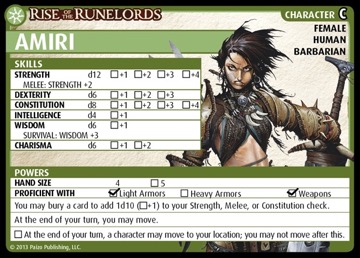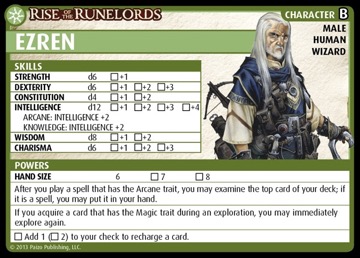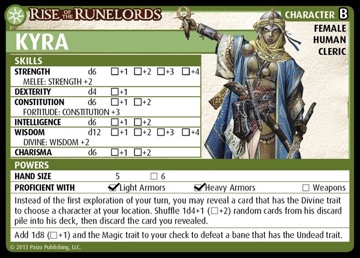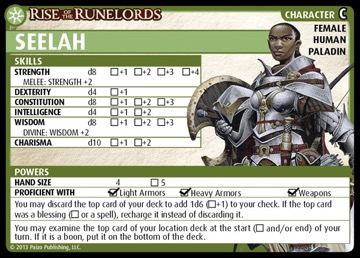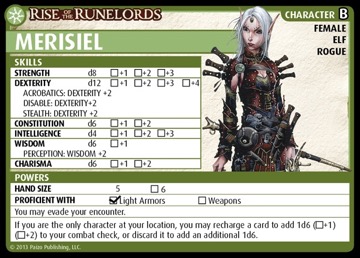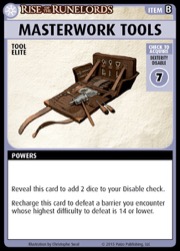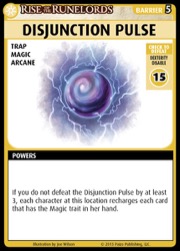| Doppelschwert |
| 1 person marked this as a favorite. |
I agree overall, even though I think the game is more fun if you have less healing. Playing Grazzle lately, the game becomes a total easy mode, since there is no risk at screwing up anymore (I seriously think the Bog Medic role should be errata'd to be less good at healing, as his healing is way more broken than the pre-errata Alain could ever hope to be - using his healing, I easily shrugged off 2-3 'Rite of Heraldry induced' handwipes per character (!) without breaking a sweat, all in a single scenario).
Regarding the temptations of WotR, I think most of them are supposed to be the analogue of the various chests in RotR, the plunder in SnS and the traders in MM, namely a thematic means to increase the odds of getting better cards. They don't need to be overcome since you can usually just ignore them; they only introduce an optional layer of risk vs reward.
As soon as you remove the nasty barriers like Demonic Horde and Arboreal Blight, you are, in my homebrew experience, much more likely to encounter a beneficial temptation than a normal barrier, at least up to getting your role card.
| Hawkmoon269 |
I like this classification of characters for thinking about the game. I think how you explain warriors to include Ezren really highlights the advantages of it.
I wonder if a category of "scouts" or "searchers" shouldn't be considered too, since knowing what is coming and setting up your characters to succeed at their roles can be quite powerful. But maybe they are fourth most important.
| zeroth_hour2 |
Lini bad at fighting... uh, what? You _can_ fix it by having someone (Harsk) with a lot of ranged weapons pass one off to her. If nothing else, she can also discard a card to shapeshift. That's not even talking about the fact that the d4 +x from the animal can be used on a combat check.
If you don't have that support, she becomes a bit weaker, but not Siwar/S&S Lem/Olenjack levels of weak.
Anyways, my philosophy is this: everyone has to be able to fight monsters to a certain degree, because explores are precious and you don't get to choose when to fight. If you are too inefficient at fighting, then you are inefficient at exploring (because you're often too afraid to take your normal explore, and even if you did you may need to throw 3-4 cards at a normal fight). If you're inefficient at exploring, you'd better have something else big to bring to the table. Healers buy explores, directly through returning cards that discard to explore and indirectly by returning cards that enhance checks, allowing people to be less conservative. This is why RotR Kyra for example can get away with a low Strength die.
The definition of Disabler outlined in this article only works for Rise of the Runelords. Skulls and Shackles have a significant number of locations and barriers that force you to use Fortitude. In fact, I think the definition of Disabler here should be expanded to encompass going to "unsafe" locations (eg Mountain Peak because it forces you to bury a card every turn if you don't have a Wisdom-focused character, or some of the Fortitude check locations in S&S that do the same thing.)
I do have a classification system for my characters, but it's kind of different. Like hawkmoon said, scouting or other types of information gathering allow you skip over encounters that you would otherwise throw a lot of resources on.
I think this is a good basis for an article. I actually agree with most of it. The Lini thing annoys me.
| Jason S |
Yep, Lini can fight. I soloed Rise with her. She can overcome any threat and recover from any loss of cards.
I personally don't find disablers are needed at all. Not with MW Tools, blessings, and spells like Find Traps. Like you said it depends on the adventure path, maybe you've had more experience with S&S and mine has been with Runelords and Wrath.
I enjoy these articles, makes me want to play again.
| Frencois |
Nice blog. Would like "as usual" to add that things are different with a small or large party.
With 2 characters, you need to "survive" 15 turns each. Ang to get rid of henchmen. Thus warriors and healers indeed. With 6 characters, it's only 5 turns each. Surviving is a different story and "who will encounter what" starts to be key. Thus the addition of "scouts" or "I can help and act out of turn" or "jack of all trades". Mavaro, Alahazra, Ahmotep, Harsk and others are killers in large groups.
So indeed seat 1 is warrior, seat 2 is healer, but from seat 4 to seat 6 not sure that dosabler would be my first choice. You need a second warrior around seat 4 or 5 too.
| Irgy |
Re Lini fighting discussion, I agree with the article, yes she can fight, but she's still worse at it than any other character. Divine spells are mostly weaker than arcane at combat, and she has no ability to help ensure she has one available. Otherwise, yeah she can use a weapon, if you give her one and she discards a card for a better dice. Or later she can even take the proficiency and a slot. But every character has some ability to fight, the point is Lini is the one who has to jump through the most hoops just to even catch up.
As far as the article generally goes, I think a more important third category is a support character. Especially in a larger party. Someone who can add to other people's checks and shore up the party's weaknesses.
I don't actually find having a barrier specialist is important for its own sake at all. Firstly barriers use all the different skills and nobody covers them all, and at the same time even the warriors will cover a few of them. Secondly you have only limited control over who encounters them. I think the a disabler is a good choice only so far as it results in balanced skills (as I'm about to mention).
The two other things I always pay attention to when building a party:
1. Balancing skills so there's always someone who can close each location.
2. Balancing the need for different types of cards, so that everything we find is useful to someone and no-one's missing out on upgrades because they have to fight with another player for them.
| Scott Hall |
Irgy wrote:... other things I always pay attention to when building a party:
1. Balancing skills so there's always someone who can close each location.^This.
We always consider our ability to close, especially when picking the last 1-2 characters in a party.
Oh yeah. We ended up with a rough go early in MM because we had no one with diplomacy or a charisma above d6.
| Zhayne |
Unfortunately, you can't really change your party in the middle of an adventure path if your composition sucks. So...
Well, you *can* under the 'it's your game, play it your way' clause. If something's getting in the way of your fun, then change it.
Our group mostly worries about having a d10 or better in every stat, as well as at least one arcane caster and one divine caster when you look at the whole group. We usually have 4 players, so it's not hard, but some combinations are rarer than others (STR+INT springs to mind).
This is a big part of why we generally love the die-swap items (Topaz of Strength, etc), because it really boosts the versatility of who can close what.
| Brother Tyler |
Ummm... what's Seelah's built in healing?
Seelah from the Paladin Class Deck has a core healing power (very weak compared to some of the clerics, but definitely helpful).
Seelah from Wrath of the Righteous has the Inheritor's Blade role, which provides a minor healing power (the bottom power about using the Blessing of Iomedae).
| elcoderdude |
jones314 wrote:Ummm... what's Seelah's built in healing?Seelah from the Paladin Class Deck has a core healing power (very weak compared to some of the clerics, but definitely helpful).
Seelah from Wrath of the Righteous has the Inheritor's Blade role, which provides a minor healing power (the bottom power about using the Blessing of Iomedae).
Also, apropos of the blog focus on RotR: RotR Seelah's Hospitaler role has the feat:
During your turn, you may bury a Divine card and choose a character at your location to shuffle 1d4+1 random cards from his discard pile into his deck.
| Mark Seifter Designer |
I don't actually find having a barrier specialist is important for its own sake at all. Firstly barriers use all the different skills and nobody covers them all, and at the same time even the warriors will cover a few of them. Secondly you have only limited control over who encounters them. I think the a disabler is a good choice only so far as it results in balanced skills (as I'm about to mention).
I tend to agree on this for most characters, and with zeroth_hour as well about "Disabler" meaning something different everywhere but Runelords. However, there are a few characters, not listed in the blog, that (eventually) get a power like "For your check against a barrier, roll an X check instead" and characters like Zetha who can always roll Stealth on everything, and those few who can do that are able to serve an explicit anti-barrier purpose in terms of leaping into barrier-heavy locations. Otherwise, yeah, it's all about diversity and good special powers. As a good example of your point: Our current three-person team is getting along well with Feiya (MVP) to hex everything and then draw back a full hand anyway with Tetisura the Sphinx, Zetha (to make all the checks Stealth), and Cogsnap (because Twitch Tonic spam means finishing a location per turn) even though we don't have a consistent warrior or a healer.
| Zhayne |
I firmly disagree that Warriors are the most important. I have played many games with no dedicated warriors, and very few with no healers. The ones with no healers were more likely to be failures (including character deaths) than the ones with no warriors.
If you don't have any warriors, though, your healers won't be able to do anything else because they're likely to get their butts handed to them constantly.
Healers are vital support characters, but they need someone to support to be useful. You won't be able to heal faster than you're taking damage.
If you play Overwatch, imagine a team with six Mercies in it.
| Zhayne |
I like this classification of characters for thinking about the game. I think how you explain warriors to include Ezren really highlights the advantages of it.
I wonder if a category of "scouts" or "searchers" shouldn't be considered too, since knowing what is coming and setting up your characters to succeed at their roles can be quite powerful. But maybe they are fourth most important.
I tend to imagine a fourth category simply as 'support' (maybe I play too much Overwatch). Scouts wind up in that group and they can be crazy useful. I played Alahazra in S&S once and it almost felt like cheating. I rarely had cards in hand on my turn, so I didn't often explore, but every turn seemed to be optimal, especially once I got the feat that let me encounter boons. "Anybody want this? No? I'll encounter it."
| Xexyz |
| 1 person marked this as a favorite. |
I agree overall, even though I think the game is more fun if you have less healing. Playing Grazzle lately, the game becomes a total easy mode, since there is no risk at screwing up anymore (I seriously think the Bog Medic role should be errata'd to be less good at healing, as his healing is way more broken than the pre-errata Alain could ever hope to be - using his healing, I easily shrugged off 2-3 'Rite of Heraldry induced' handwipes per character (!) without breaking a sweat, all in a single scenario).
Grazzle's healing power - especially if you go Bog Medic - is IMO the most powerful character ability in the game. More than any other character's power it changes the way the game gets played because it allows everyone to burn through their decks with little fear of death.
 James McKendrew
James McKendrew
|
If you don't have any warriors, though, your healers won't be able to do anything else because they're likely to get their butts handed to them constantly.
I don't know what to say. Our parties succeed more often than parties with warriors and inadequate healing. We mostly play casters. There's an occasional Monk, and every so rarely a Fighter, but we clean up without dedicated warriors.
| ShannonA |
LINI. I had a feeling that claiming Lini was a weak fighter would cause controversy, because she's so good out-of-combat and thus well-loved. But Irgy did a great job of detailing the thinking behind this: yes, she can become OK, but she has to jump through a lot of hoops, from getting weapon hand-offs to burning cards.
ALTERNATES. I agree that Support and Scout are great alternate ideas for an important third class.
OTHERS. There was some mention of other criteria for selecting party members, such as covering all the closing skills, and I simply say: watch for the next two articles.
 Eliandra Giltessan
Eliandra Giltessan
|
Hawkmoon269 wrote:I tend to imagine a fourth category simply as 'support' (maybe I play too much Overwatch). Scouts wind up in that group and they can be crazy useful. I played Alahazra in S&S once and it almost felt like cheating. I rarely had cards in hand on my turn, so I didn't often explore, but every turn seemed to be optimal, especially once I got the feat that let me encounter boons. "Anybody want this? No? I'll encounter it."I like this classification of characters for thinking about the game. I think how you explain warriors to include Ezren really highlights the advantages of it.
I wonder if a category of "scouts" or "searchers" shouldn't be considered too, since knowing what is coming and setting up your characters to succeed at their roles can be quite powerful. But maybe they are fourth most important.
I'm also trying to think where I put S&S Alahazra and her ilk in this hierarchy. Because she HAS a warrior role---Tempest---but almost no one takes that role because Stargazer is just too good. I think it goes back to another one of these posts about exploring being the most valuable thing---she can go through a whole ton of cards.
The thing is, while Alahazra is one of the most powerful support characters in the game, the game is perfectly playable without her. On the other hand, you can't play a game without someone who is good at handling monsters.





